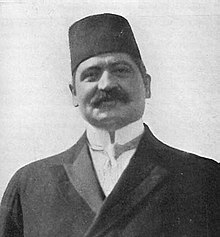This is an old revision of this page, as edited by GrahamHardy (talk | contribs) at 10:37, 5 September 2013 (publisher change). The present address (URL) is a permanent link to this revision, which may differ significantly from the current revision.
Revision as of 10:37, 5 September 2013 by GrahamHardy (talk | contribs) (publisher change)(diff) ← Previous revision | Latest revision (diff) | Newer revision → (diff) | |
| Author | Henry Morgenthau, Sr. |
|---|---|
| Original title | Ambassador Morgenthau's Story |
| Language | English |
| Subject | Literature / Memoirs |
| Publisher | Doubleday, Page |
| Publication date | 1918 |
| Publication place | USA |
| Media type | Print (Hardcover) |
| Pages | 407 pages |
Ambassador Morgenthau's Story (1918) is the title of the published memoirs of Henry Morgenthau, Sr. covering the time when he was Woodrow Wilson's American ambassador to Constantinople, 1913-1916. The book took over two years to complete. The ghostwriter for Henry Morgenthau was Burton J. Hendrick. However, a comparison with official documents filed by Morgenthau in his role as ambassador shows that the book must have been structured and written extensively by Morgenthau himself.
The book has been used as a primary source regarding Turkish atrocities against the Armenians, the Armenian Genocide.
When published, the book came under criticism by two prominent American historians regarding its coverage of Germany in the weeks before the onset of the war.
Content
The former American Ambassador to the Ottoman Empire, Morgenthau relates his experience with German-Ottoman relations during the World War. He referred to the CUP as the "Boss System" in the Ottoman Empire, and related how it was proved useful to Germany to bring the Empire to its side. Also the book gives details of Germany's influence in preventing the sale of American warships to Greece. Germany's plans for new territories, coaling stations, and indemnities and closing the Dardanelles and so separates Russia from her Allies. Ottoman Empire's abrogation of the capitulations.
On the Van Resistance
See also: Van Resistance
Morgenthau reports from Aleppo and Van. As he quoted the testimonies of the consulate officials, both justified the deportations as necessary to the conduct of the war, suggesting that the complicity of the Armenians of Van with the Russian forces that had overtaken the city justified the persecution of all ethnic Armenians.
In his memoirs, Morgenthau later suggested that, "When the Turkish authorities gave the orders for these deportations, they were merely giving the death warrant to a whole race; they understood this well, and, in their conversations with me, they made no particular attempt to conceal the fact."
Discussions with Turkish leaders
See also: Talat Pasha
It was some time before the story of the Armenian atrocities reached the American Embassy in all its details. Ambassador Morgenthau raised the issue with Talaat Pasha and Enver Pasha in person. When Morgenthau asked both whether the information reaching the embassy was reliable, the tendency was at first to regard them as mere manifestations of the disorders that had prevailed in the Armenian provinces for many years. When the consular reports came from Van and then Urfa, both Enver Pasha and Talaat Pasha dismissed them as wild exaggerations.
The ambassador asked the U.S. Government to intervene, but the United States was not at that time a participant in World War I and could only have made written or verbal protests to the Turkish authorities. This was not done and Morgenthau was left without leverage beyond his personal rapport with those in power; when that failed, he drew international media attention to the genocide and organized private relief efforts.
Reviews
In his Ph.D. thesis of 1957, Ralph Elliot Cook notices that the pronounced anti-German outlook of the book is absent of Morgenthau's archives.
In 1990, Heath Lowry publishes an analyzis comparing several allegations of Morgenthau in his book with Morgenthau's personal archives (personal diary, dispatches to Washington, letters to his family), finding many discrepancies and concluding that Morgenthau's allegations against Turkish leaders in his book are unsubstantiated by his archives. Gilles Veinstein, professor of Ottoman and Turkish history at the Collège de France considers as "rather instructive" Heath Lowry's analyzis about Morgenthau
Guenter Lewy "checked some of these alleged differences and found them real", especially about the meetings between Morgenthau and Talat Pasha, so shares Heath Lowry's main conclusions about Ambassador Morgenthau's Story.
Ambassador Morgenthau's Story was republished by Wayne State University Press in 2003, edited by Peter Balakian, with a foreword by Robert Jay Lifton, an introduction by Roger W. Smith, and an epilogue by Henry Morgenthau III.
Gallery
Some of the photographs contained in the memoirs include:
-

-
 Mehmet Talat Pasha and Richard von Kühlmann
Mehmet Talat Pasha and Richard von Kühlmann
-

-
 Armenians massacred at Erzinjan.
Armenians massacred at Erzinjan.
-

-

Other editions
- Republished 2003 by the Gomidas Institute. The new edition features an introduction by Ara Sarafian.
Notes
- The book was dedicated to Wilson.
- Ambassador Morgenthau's Story. 1918. Chapter Twenty-Seven
- The United States and the Armenian Question, 1894-1924, Flechter School of Law and Diplomacy, 1957, p. 129
- The Story Behin "Ambassador Morgenthau's Story", Istanbul: The Isis Press, 1990
- "Trois questions sur un massacre", L'Histoire, April 1995.
- The Armenian Massacres in Ottoman Turkey, Salt Lake City: University of Utah Press, 2005, pp. 140-142.
- Ambassador Morgenthau's Story. 1918. Chapter Twenty-Seven
See also
- Secrets of the Bosphorus by Henry Morgenthau, Sr. (1918) .
External links
- Ambassador Morgenthau's Story On-line text.